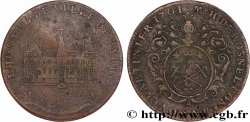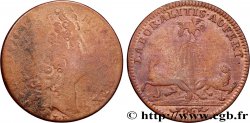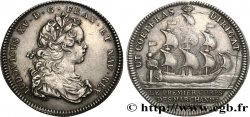fjt_01104 - CORPORATIONS Brodeurs - Chasubliers 1704
Not available.
Item sold on our e-shop (2012)
Price : 180.00 €
Item sold on our e-shop (2012)
Price : 180.00 €
Type : Brodeurs - Chasubliers
Date: 1704
Metal : silver
Diameter : 28,5 mm
Orientation dies : 6 h.
Edge : lisse
Rarity : R2
Catalogue references :
Obverse
Obverse legend : MARCHANDS. BRODEURS. CHASUBLIERS.
Obverse description : Armes des marchands brodeurs - chasubliers.
Reverse
Reverse legend : SANS. VOUS. IE. NE. PUIS. VIVRE ; À L'EXERGUE : 1704.
Reverse description : Un jardin de plantes tinctoriales sous le soleil.
Commentary
Ce jeton marque en 1704 la redéfinition des statuts qui réduisent le nombre de maîtres brodeurs à 200. La volonté est de revenir au même nombre qu'au XIIIe siècle, pour conserver une bonne organisation intérieure et préserver les traditions de cet art.
Les ouvrages de cette communauté ne se bornaient pas aux ornements d'église dont les chasubliers avaient le privilège. Ils comprenaient entre autres les broderies d'uniformes pour les compagnies militaires.
Le choix des plantes tinctoriales comme revers fait tout à fait sens pour une corporation dont la matière première était l’étoffe et le fil.
Les ouvrages de cette communauté ne se bornaient pas aux ornements d'église dont les chasubliers avaient le privilège. Ils comprenaient entre autres les broderies d'uniformes pour les compagnies militaires.
Le choix des plantes tinctoriales comme revers fait tout à fait sens pour une corporation dont la matière première était l’étoffe et le fil.








 Report a mistake
Report a mistake Print the page
Print the page Share my selection
Share my selection Ask a question
Ask a question Consign / sell
Consign / sell
 Full data
Full data



